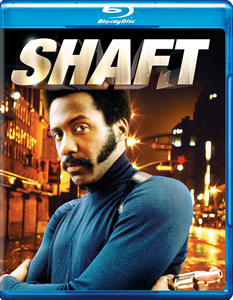If nothing else, “Shaft” (1971) – which led to four sequels and a TV series – has style. Director Gordon Parks opens on Richard Roundtree’s private detective John Shaft walking the grimy, gritty streets of New York and hitting up the shoe-shiner for information. Isaac Hayes’ iconic, Oscar-winning “wakka-chicka-wakka” theme kicks in and eventually the singer spells out that Shaft is the coolest cat around, feared by criminals, loved by the ladies.
Hardboiled
“Shaft” is categorized as Blaxploitation, and that’s probably what kept me from watching it for a long time, thinking it’s a genre that might not be easy for me to appreciate. But in many ways, “Shaft” is a straight-ahead hardboiled private-eye yarn.
Commentary on the black condition is peppered in by writers Ernest Tidyman and John D.F. Black, working from the former’s novel. Hayes’ “Soulsville” also very particularly spells out the inner-city situation, with specifics such as “Rent is two months past due, in a building that’s falling apart.”

“Shaft” (1971)
Director: Gordon Parks
Writers: Ernest Tidyman (screenplay, novel), John D.F. Black (screenplay)
Stars: Richard Roundtree, Moses Gunn, Charles Cioffi
It’s a garnish rather than the main dish, but nonetheless “Shaft” is plugged into the black experience. Things come up randomly – a cab bypasses Shaft to pick up a white passenger instead – but that’s the way Shaft’s life is, so I can dig it.
‘Born poor,’ but moving on up
Shaft, for his part, lives in a swank apartment in a solid building where he can afford the rent. Finding this out halfway through the film – in one of two sequences where he effortlessly beds a chick – is somewhat surprising. Earlier, in his office with exposed pipes, I thought perhaps Shaft is down on his luck. Shaft says he has two problems – “I was born black, and I was born poor” – but we’re catching him at the top of his career arc, it seems.
To a modern action fan — the generation that’s more familiar with Sam Jackson’s 2000 entry in the saga — “Shaft’s” fistfights and shootouts are tame, although I can’t scoff at any movie where a fight features a guy flying out a window to his death – and that’s not even the end of the fight. Shaft questions his other opponent after that. The blood is still on the wall when we revisit the office – this illustrates the film’s attention to detail or its cheapness, or both.
Banter with the Blue
The biggest pleasures come from Shaft’s banter with police detective Vic Androzzi (Charles Cioffi), who has an uneasy yet mutually respectful relationship with the private eye. Every conversation drips with the impression that Androzzi and Shaft don’t exactly love their jobs, but hey, this is all they know.
Androzzi won’t pursue the “guy flying through the window” case if Shaft helps him dig into what’s going on Harlem. Shaft also probes a kidnapping of black drug lord Bumpy’s (Moses Gunn) daughter.

Hayes saves the day
The picture ends with the most ambitious action sequence, as Bumpy’s drug enterprise and the Mafia battle. But sometimes I thought “What if Hayes’ score wasn’t playing?” Then “Shaft’s” cheap B-movie qualities might be exposed. The film also feels overlong, even though it’s only 100 minutes. This is not what you’d call a tight, lean action film by any era’s standards.
Some scenes – like when Shaft poses as a bartender as he investigates two likely Mafia members – take a long time to get to where they are obviously going. Roundtree’s swagger and Shaft’s control of most situations keep a viewer patient, but I can’t say many moments are surprising.
Still, “Shaft” captures 1971 NYC in all its gorgeous disgustingness and introduces a cool customer. It’s rightly appreciated as a historically important film in the hardboiled and action genres, in addition to Blaxploitation.

